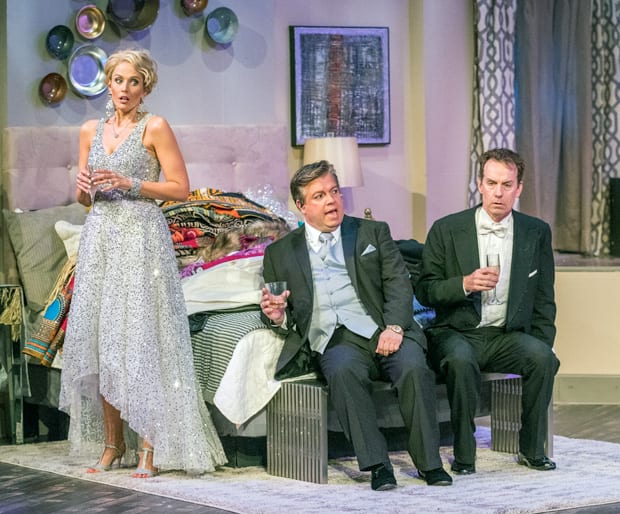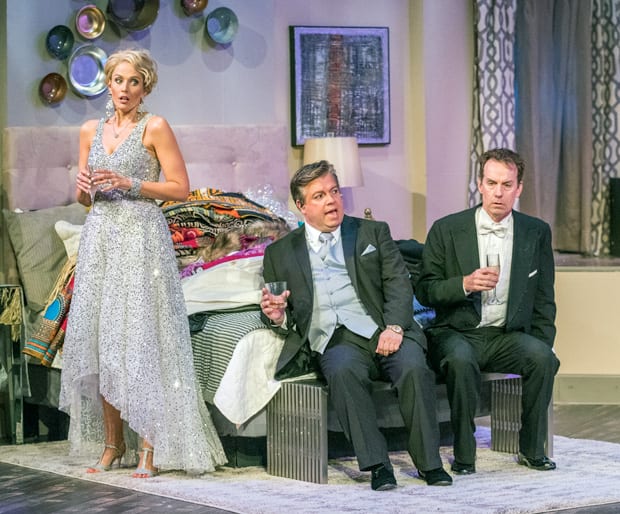Uptown Players’ farce ‘It’s Only a Play’ lets fly a whirlwind of laughter

Cara Statham-Serber, B.J. Cleveland and Chamblee Ferguson await a make-or-break review in the backstage farce “It’s Only a Play.’ (Photo by Mike Morgan)
ARNOLD WAYNE JONES | Executive Editor
jones@dallasvoice.com
“I don’t read reviews.”
Oh, how many times I’ve heard that one. Almost as many as my reviews have been excerpted, or I’ve been thanked for my kind comments, or excoriated for my “jackass” opinions.
“Don’t read reviews.” Sheeesh. And Hillary doesn’t care about polls.
 Let’s face it: Basic human ego craves feedback from other humans. “Does this dress make me look fat?” “Was I the first?” “Did you like my Instagram pic? I’ll like yours.” Some people take reviews as constructive criticism to find room to improve. Some think of them as part of the business part of show business. And some — Terrence McNally, for instance, with It’s Only a Play, now at the Kalita Humphreys — treat them as the basis for creativity. And maybe a little revenge.
Let’s face it: Basic human ego craves feedback from other humans. “Does this dress make me look fat?” “Was I the first?” “Did you like my Instagram pic? I’ll like yours.” Some people take reviews as constructive criticism to find room to improve. Some think of them as part of the business part of show business. And some — Terrence McNally, for instance, with It’s Only a Play, now at the Kalita Humphreys — treat them as the basis for creativity. And maybe a little revenge.Although not a new play — McNally wrote it back in the 1980s, after an apparent falling out with Nathan Lane — this version of It’s Only a Play made its Broadway debut last year: Updated, smoothed over (Lane starred in it) and sharpened. It’s the Inside Baseball of theater contrivances. It’s opening night of a new American play, The Golden Egg, and members of the company are gathering in the bedroom of the show’s producer, Julia Budder (Cara Statham-Serber).
There’s a lot riding on the show: it’s the Broadway debut of playwright Peter Austin (Chamblee Ferguson) whose work has kept him busy in regional theater without a mainstream hit. He’s assembled a promising team, including Oscar winning actress Virginia Noyes (Shannon McGrann) trying to polish her tarnished rep as an addict; and celebrated British director Frank Finger (Luke Longacre). All that’s missing from the lineup is Austin’s best friend James Wicker (B.J. Cleveland), who turned down the leading role, ostensibly because he couldn’t get out of his long-running sitcom, but actually because the thinks the script for The Golden Egg is a piece of shit.
But who will New York Times theater critic Ben Brantley agree with? That’s what holds everyone’s attention throughout Act 1; in Act 2, they deal with the fallout.
McNally clearly considers critics a necessary evil — resenting the sway some can hold, but respecting their ability to generate excitement for new American plays. The problem is, where are all the new American plays? Not on Broadway, it seems, which has become a clearinghouse for revivals, musicals, and musical adaptations of revivals of plays. And whose fault is that? Not the critics… unless you count ones like Ira Drew (Steven D, Morris), a John Simon-esque hatchet man who revels in crafting hate-filled one-liners that unfairly torpedo good work, while desperately seeking popularity with the theater community itself. In McNally’s world, we’re all victims, all conspirators, and all capable of making a difference … even though we rarely do.
And the conundrum of It’s Only a Play is, McNally clearly has a ball making his characters outrageous caricatures who spew venom like cobras. Some of the biggest laughs in this broadest of farces come from the unbridled assessments of bad theater. There’s nothing remotely accurate about the reviews the characters read of their own play, but that’s all part of the fantasy: Theater is removed from reality, a place where we create our own happy endings and live out our petty vengeances. Why not have fun doing it?
The cast of this production is certainly having huge amounts of fun. The show has been crafted to give great gags and set-pieces to its cast, from McGrann’s scene-stealing druggy to Matt Holmes as the innocent farmboy in NYC for the first time to Statham-Serber Malapropping all over the place. Cleveland, who usually gets handed the most flamboyant roles, gets to underplay it some here. He’s the vain but comparatively stable eye of this hurricane of hilarity.
Cheryl Denson’s direction is a master class in comedic pacing, knowing how to sneak visual gags and in-jokes (example: pay close attention to all the coats brought in from party guests) that layer like symphonic orchestrations rather than drown you in a fusillade of hit-or-miss one-liners. It’s a bright and chuckle-filled evening, tailor-made for devoted theater queens who like a little insider — or in this case, backstage — humor.
This article appeared in the Dallas Voice print edition July 22, 2016.














